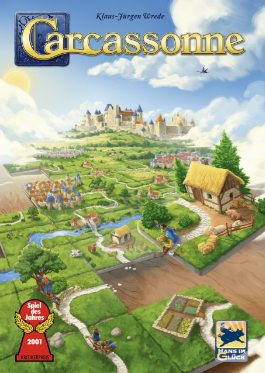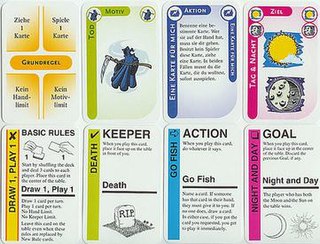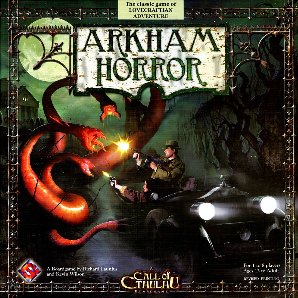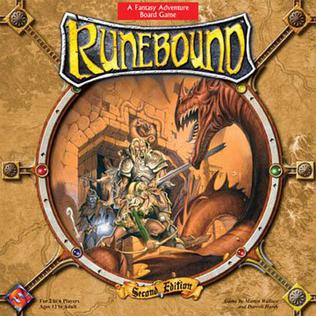
Civilization is a board game designed by Francis Tresham, published in the United Kingdom in 1980 by Hartland Trefoil and in the United States in 1981 by Avalon Hill. The Civilization brand is now owned by Hasbro. It was out of print for many years, before it saw republication in 2018, by Gibsons Games. The game typically takes eight or more hours to play and is for two to seven players.

Carcassonne is a tile-based German-style board game for two to five players, designed by Klaus-Jürgen Wrede and published in 2000 by Hans im Glück in German and by Rio Grande Games and Z-Man Games (currently) in English. It received the Spiel des Jahres and the Deutscher Spiele Preis awards in 2001.
An expansion pack, expansion set, supplement, or simply expansion, is an addition to an existing role-playing game, tabletop game, video game, collectible card game or miniature wargame. These add-ons usually add new game areas, weapons, objects, characters, adventures or an extended storyline to an already-released game.

Fluxx is a card game, played with a specially designed deck published by Looney Labs. It is different from most other card games, in that the rules and the conditions for winning are altered throughout the game, via cards played by the players.

Cosmic Encounter is a science fiction–themed strategy board game designed by "Future Pastimes" and originally published by Eon Games in 1977. In it, each player takes the role of a particular alien species, each with a unique power to bend or break one of the rules of the game, trying to establish control over the universe. The game was inducted into the Academy of Adventure Gaming Arts & Design Adventure Gaming Hall of Fame in 1997.
Chrononauts is a family of card games that simulates popular fictional ideas about how time travellers might alter history, drawing on sources like Back to the Future and the short stories collection Travels Through Time. The game was designed by Andrew Looney and is published by Looney Labs. The original game and a variant each won the Origins Award for Best Traditional Card Game.

Legend of the Five Rings is a fictional setting created by John Zinser, Dave Seay, Ryan Dancey, Dave Williams, DJ Trindle, Matt Wilson and John Wick and first published by a joint venture between Alderac Entertainment Group and ISOMEDIA in 1995. The setting primarily involves the fictional empire of Rokugan, though some additional areas and cultures have been discussed. Rokugan is based roughly on feudal Japan with influences from other East Asian cultures such as China, Mongolia and Korea. This setting is the basis for the Legend of the Five Rings Collectible Card Game as well as the Legend of the Five Rings Roleplaying Game. Legend of the Five Rings was also the "featured campaign setting" of the Oriental Adventures expansion to the third edition of Dungeons & Dragons, though this book is now out of print.

El Grande is a German-style board game for 2-5 players, designed by Wolfgang Kramer and Richard Ulrich, and published in 1995 by Hans im Glück in German, by Rio Grande Games in English, and by 999 Games in Dutch. The game board represents renaissance-era Spain where the nobility fight for control of the nine regions. El Grande was praised for its area-control mechanism, and was awarded the Spiel des Jahres prize and the Deutscher Spiele Preis in 1996. Following its release, several expansions and an alternative version were published.

Call of Cthulhu: The Card Game is an out-of-print card game produced and marketed by Fantasy Flight Games from 2004 to 2015. It is based on Chaosium's Call of Cthulhu role-playing game, the writings of H. P. Lovecraft, and other Cthulhu Mythos fiction.

Citadels is a German-style card game, designed by Bruno Faidutti, originally published in French as Citadelles by MultiSim in 2000, illustrated by Julien Delval, Florence Magnin, Jean-Louis Mourier and Cyrille Daujean as graphic designer for the first edition. Sometime later, Citadels was published in German as Ohne Furcht und Adel, which means "Without Fear or Nobility".

Bang! is a Spaghetti Western-themed social deduction card game designed by Emiliano Sciarra and released by Italian publisher DV Giochi in 2002. In 2004, Bang! won the Origins Award for Best Traditional Card Game of 2003 and Best Graphic Design of a Card Game or Expansion.
Modern Art is an auction game designed by Reiner Knizia and first published in 1992 by Hans im Glück in German. Players represent art dealers, both buying and selling works of art by five different fictional artists. At the end of each round, they sell the paintings they bought back to the "bank". More popular artists' works are worth more, and the value carries over into future rounds. Although the game is played entirely using cards, a board is used for scoring, so the game is sometimes referred to as a board game. 25 versions has been released for the game. It was also recommended for the 1993 Spiel des Jahres.
Hans im Glück is a German board and card game publisher. Though many of their own games are language-independent they themselves publish only printings for the domestic market which include only German-language rules; English-language printings of their games have been published primarily by Rio Grande Games, Dutch versions by 999 Games and so on.

Arkham Horror is a cooperative adventure board game designed by Richard Launius, originally published in 1987 by Chaosium. The game is based on Chaosium's roleplaying game Call of Cthulhu, which is set in the Cthulhu Mythos of H. P. Lovecraft and other horror writers. The game's second edition was released by Fantasy Flight Games in 2005, with a third edition in 2018.

Runebound is a high fantasy adventure board game created by Martin Wallace and Darrel Hardy and published by Fantasy Flight Games in 2004. A second edition was published in 2005. A third edition was released in 2015. In Runebound, one to six players take the roles of adventurers who seek out quests. The quests are then resolved with either victory for the player, or a loss of some item. Each player is seeking quests and trying to gain experience which results in greater power and combat skill.

Pandemic is a cooperative board game designed by Matt Leacock and first published by Z-Man Games in the United States in 2008. Pandemic is based on the premise that four diseases have broken out in the world, each threatening to wipe out a region. The game accommodates two to four players, each playing one of seven possible roles: dispatcher, medic, scientist, researcher, operations expert, contingency planner, or quarantine specialist. Through the combined effort of all the players, the goal is to discover all four cures before any of several game-losing conditions are reached.

Catan, previously known as The Settlers of Catan or simply Settlers, is a multiplayer board game designed by Klaus Teuber. It was first published in 1995 in Germany by Franckh-Kosmos Verlag (Kosmos) as Die Siedler von Catan. Players take on the roles of settlers, each attempting to build and develop holdings while trading and acquiring resources. Players gain victory points as their settlements grow and the first to reach a set number of victory points, typically 10, wins. The game and its many expansions are also published by Catan Studio, Filosofia, GP, Inc., 999 Games, Κάισσα (Káissa), and Devir. Upon its release, The Settlers of Catan became one of the first Eurogames to achieve popularity outside Europe. As of 2020, more than 32 million copies in 40 languages had been sold.

The BattleTech Trading Card Game is an out-of-print collectible card game (CCG) set in the BattleTech universe. The game was developed by Wizards of the Coast (WotC) for FASA and released in 1996. It went out of print after its last expansion, Crusade, in 1998.

Village is a historical-themed euro-style board game with a focus on resource management for 2-4 players, released in 2011. It is designed by Inka Brand and Markus Brand.

Star Realms is a card-based deck-building science-fiction tabletop game, designed by Rob Dougherty and Darwin Kastle and published in 2014 by Wise Wizard Games. The game started out as a Kickstarter campaign in 2013. The goal of Star Realms is to destroy opponents by purchasing cards using "trade" points and using these cards to attack an opponent's "authority" using "combat" points. The game takes place in a distant future where different races compete to gain resources, trade and outmaneuver each other in a race to become ruler of the galaxy.
















